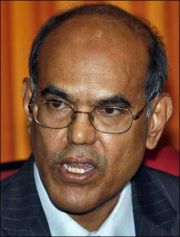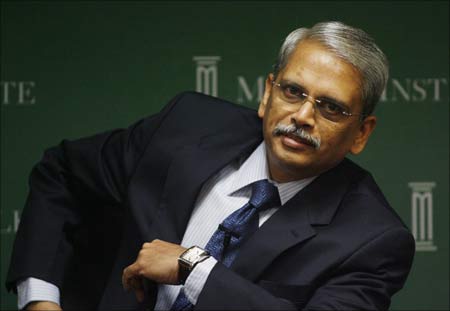 RBI Governor D Subbarao explains the rationale for the moves announced in the second quarter review of the monetary policy in an interview with Sidhartha. Excerpts:
RBI Governor D Subbarao explains the rationale for the moves announced in the second quarter review of the monetary policy in an interview with Sidhartha. Excerpts:
Is this the start of the exit from an accommodative stance?
It is a fair characterisation of our stance. This is the first phase of the exit.
You have initiated some steps related to commercial real estate and NBFCs. Is it because you are seeing an asset price pressure building up?
I do not think there is an asset price build-up in the way you have mentioned. That's potentially possible but we are far from it. However, we are watching asset prices.
The equity market has grown by 75 per cent this fiscal year, gold is at an all-time high, real estate prices, especially personal housing, are high.
Our measures today in terms of provisioning requirements for the commercial real estate sector, at the aggregate level, have been formed by different considerations. You must note that the share of the commercial real estate sector in non-food credit is around 3.7 per cent.
But two considerations prompted us to initiate steps. One, the pace of credit going to the commercial real estate sector is the highest. Two, in the restructuring done, at the aggregate level, the share of restructured assets to total assets is 4.7 per cent.
But in the commercial real estate space, the share of restructured assets to total assets is over 14 per cent. Evidently, there is some stress building up there. In the commercial real estate sector, unlike in the retail housing sector, there has been no price adjustment. So, we thought it prudent to raise the provisioning requirement for standard assets.
What about banks being asked to increase the provisioning cover?
That's the second part of the provisioning requirement. It is a counter-cyclical measure to encourage banks to build up a buffer when their profitability is reasonably good.
Is it also because banks have restructured loan accounts and some of these assets may face pressure in the months ahead?
That's quite possible. In the real world we must expect some of the restructured assets to turn into NPAs (non-performing assets). The probability of a restructured asset turning into an NPA is probably higher. But at the moment, NPAs are within reasonable levels. In fact, NPAs in the commercial real estate sector are lower than the aggregate level.
YOU have talked about it in the past. Today also you have referred to concerns over the exposure that banks have to mutual funds, which in turn have an exposure to companies. Are you going to do something to check an increase?
There has been a very rapid expansion of the amount of money invested by commercial banks in debt-oriented mutual funds. It is partly the result of the enormous amount of liquidity in the system and banks are making a rational decision.
There is nothing wrong with that because we are giving them 3.25 per cent in the reverse repo window and they get more from mutual funds and that is also tax-free.
However, there is also a concern that through the mutual funds, there is circularity of money.
There is a second concern that there could be a regulatory arbitrage in the sense that mutual funds are lending to companies, which banks could not directly lend to. So, all these concerns were discussed in the meeting with bankers today.
What we have decided is that banks will act as a self-regulating organisation for this purpose. They will also discuss at the level of the Indian Banks' Association and at the level of the boards and formulate their own guidelines.
Inflation seems to be your biggest worry. How much of pressure will that put on your actions going forward?
Well, we have said that price stability remains our fundamental commitment. At a time when there is pressure on prices, no matter that the pressure is emanating from the supply side, RBI is on the firing head. Monetary policy is the first line of defence.
If you are a monetarist like Friedman, you would say that inflation is a monetary phenomenon. So, inflation is a prime concern and we will use the monetary policy as and when we believe that it will be effective in reining in inflation and in anchoring inflationary expectations.
Does that mean that growth is a given and inflation is a bigger concern?
Inflation is a bigger concern now but I do not want to say that growth is no longer a concern. We have to strike a balance between the two. It's difficult to say that growth is no longer a concern. Growth is fragile and we need to be supporting growth.
On the issue of allowing banks to hold more bonds in the held-to-maturity category, is it a decision that has been postponed because over 80 per cent of the government borrowings have been completed?
It has nothing to do with the size of the borrowing programme or the extent of completion. It's a decision that has been taken quite independently.
What is the rationale behind the new guidelines on compensation of bank chiefs, since RBI already approves these appointments?
This decision was driven by two factors. The first is that under law, RBI is required to clear the compensation package of the CEOs of private sector banks. When proposals come to us, we evaluate them on the best knowledge basis which is the turnover, assets, size of business etc.
But banks have also told us that this sort of evaluation is not good enough, so we need have some guidelines. The second consideration was that internationally, the compensation package of senior managements of banks has become a central issue and the Financial Stability Board is formulating guidelines.
So, what we have asked banks to do is that they must have a sub-committee on compensation that must formulate guidelines for the compensation package of senior executives. When the board recommends a case to RBI, it must be accompanied by a certification that it is consistent with their own guidelines.
So, what we have tried to do is give autonomy to banks that gives them a sense of discipline.
You have liberalised ATM rollout and branch licensing. Are you also going to issue new bank licences?
We have not taken a view on that.
Last week, the Trend and Progress report talked about regulatory status quo and there is a reference to it today as well. . .
What RBI should do and what other regulators must do is an ongoing issue. Regulatory architecture is a central issue in the global financial crisis and we need to revisit our regulatory structure. But you must remember that a number of recommendations that are now on the agenda were those made before the crisis. So, we must see whether the crisis has changed the issues that need to be on the table.
Image: RBI Governor D Subbarao










